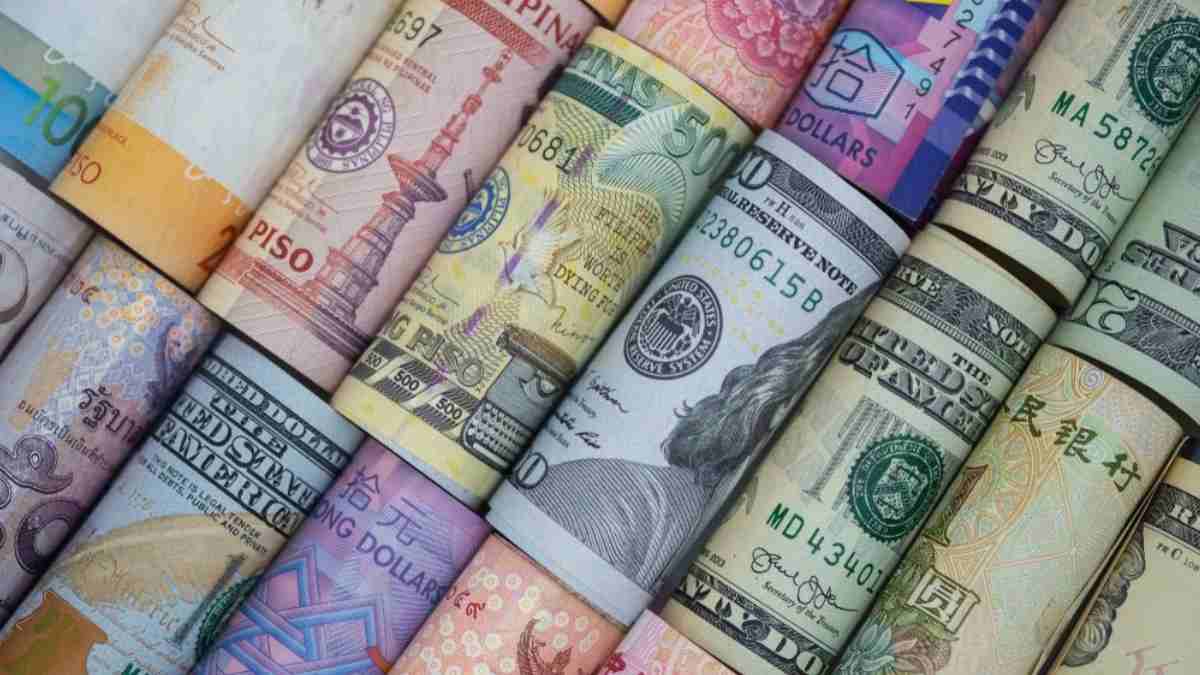Home>Finance>How Does Corruption Affect Foreign Direct Investment?


Finance
How Does Corruption Affect Foreign Direct Investment?
Modified: December 30, 2023
Discover how corruption in finance impacts foreign direct investment and learn the ramifications it has on global economies. Uncover the relationship between corruption and investment in this enlightening analysis.
(Many of the links in this article redirect to a specific reviewed product. Your purchase of these products through affiliate links helps to generate commission for LiveWell, at no extra cost. Learn more)
Table of Contents
- Introduction
- Definition of Corruption
- Overview of Foreign Direct Investment
- Relationship between Corruption and Foreign Direct Investment
- Direct Effects of Corruption on Foreign Direct Investment
- Indirect Effects of Corruption on Foreign Direct Investment
- Factors Influencing the Impact of Corruption on Foreign Direct Investment
- Case Studies on the Effect of Corruption on Foreign Direct Investment
- Strategies to Tackle Corruption and Promote Foreign Direct Investment
- Conclusion
Introduction
Corruption is a pervasive and detrimental problem that affects economies around the world. It is a complex phenomenon that undermines the rule of law, distorts market competition, and erodes public trust. One area where corruption has a significant impact is on foreign direct investment (FDI).
Foreign direct investment refers to the investment made by individuals or companies from one country into another country, typically with the goal of establishing a lasting interest or controlling stake in a foreign business. It plays a crucial role in economic development by facilitating capital inflow, job creation, technology transfer, and market access.
However, the presence of corruption can deter foreign direct investment and hinder economic growth. When corruption is rampant, potential investors face increased risks and uncertainties, making them reluctant to invest in countries with high levels of corruption. This is because corrupt practices can lead to unfair competition, arbitrary regulations, bribery demands, and a lack of transparency in business transactions.
Corruption can have both direct and indirect effects on foreign direct investment. Direct effects include higher transaction costs, reduced profitability, and increased vulnerability to political and regulatory risks. Indirect effects encompass undermined investor confidence, reduced productivity, weakened governance structures, and stunted economic development.
The impact of corruption on foreign direct investment is influenced by various factors, such as the scale and scope of corruption, the level of enforcement mechanisms, the effectiveness of anti-corruption measures, and the overall governance environment in a country. Understanding these factors can help policymakers and businesses devise strategies to mitigate corruption and attract foreign investment.
In this article, we will delve into the relationship between corruption and foreign direct investment, exploring the direct and indirect effects of corruption on FDI, examining factors that influence this relationship, and highlighting case studies that illustrate the impact of corruption on foreign investment. We will also discuss strategies to combat corruption and promote a favorable investment climate.
Definition of Corruption
Corruption can be defined as the abuse of power or position for personal gain or the improper use of entrusted authority for illegitimate purposes. It involves actions, both active and passive, that undermine the integrity and fairness of social, economic, and political systems. Corruption can take various forms, such as bribery, embezzlement, nepotism, extortion, fraud, and money laundering.
Corruption can occur in both public and private sectors, impacting governments, businesses, and society at large. It erodes public trust, distorts resource allocation, hampers economic growth, and perpetuates social inequality. It is a complex and multifaceted phenomenon influenced by a combination of cultural, institutional, and individual factors.
Bribery is one of the most common forms of corruption. It involves offering, giving, receiving, or soliciting something of value in order to influence the actions or decisions of individuals in positions of power. Bribery can occur in various settings, such as business transactions, procurement processes, and interactions with public officials.
Embezzlement refers to the misappropriation or theft of funds or assets by individuals who are entrusted with managing them. This often occurs in organizations or institutions where there is a lack of oversight or internal controls, allowing individuals to exploit their positions for personal gain.
Nepotism is another form of corruption that involves favoritism towards family members or close associates in matters of hiring, promotion, or the allocation of resources. This undermines fair competition, meritocracy, and the principles of equal opportunity.
Extortion is the act of obtaining something, such as money or property, through coercion or threats. It is often perpetrated by individuals in positions of power who exploit their authority to extract illegal gains from others.
Fraud involves the deliberate deception or misrepresentation of facts for personal or financial gain. It can take various forms, such as financial fraud, tax evasion, and fraudulent business practices.
Money laundering refers to the process of making illegally obtained money appear legitimate by disguising its true origin. It involves a series of transactions designed to conceal the illicit source of funds and integrate them into the legal economy.
Overall, corruption undermines the functioning of societies, inhibits economic development, and fosters a culture of impunity. Countering corruption requires a comprehensive and multi-faceted approach that includes legal reforms, institutional strengthening, enforcement mechanisms, and a commitment to promoting transparency, accountability, and ethical behavior at all levels of society.
Overview of Foreign Direct Investment
Foreign direct investment (FDI) is a critical component of global economic integration. It involves the flow of capital from one country to another, with the aim of establishing a lasting interest in the foreign economy. FDI plays a crucial role in stimulating economic growth, creating jobs, transferring technology, and facilitating access to new markets.
Foreign direct investment can take various forms, including greenfield investments, mergers and acquisitions, joint ventures, and strategic partnerships. In greenfield investments, foreign companies establish new operations or expand existing ones in a host country. This involves investing in physical infrastructure, such as factories and offices, as well as human capital development and technology transfer. Mergers and acquisitions involve the purchase or takeover of existing companies in the host country, thereby gaining control over their assets and operations. Joint ventures and strategic partnerships entail collaboration between foreign and local companies to combine resources, expertise, and market access.
The main motivations for foreign direct investment include market-seeking, resource-seeking, efficiency-seeking, and strategic asset-seeking. Market-seeking FDI occurs when companies invest in foreign markets to gain access to larger customer bases, tap into new consumer segments, or overcome trade barriers. Resource-seeking FDI focuses on accessing or exploiting natural resources, such as minerals, oil, or agriculture, that are abundant in the host country. Efficiency-seeking FDI aims to leverage cost advantages, such as lower labor costs or favorable regulatory frameworks, to improve productivity and competitiveness. Strategic asset-seeking FDI involves acquiring or investing in companies that possess valuable assets, technologies, or intellectual property rights.
FDI can bring several benefits to the host country. It contributes to economic growth by boosting domestic investment, creating employment opportunities, and stimulating technological progress. FDI can also enhance the host country’s export capacity, improve the balance of payments, and foster the transfer of managerial and technical expertise. Moreover, FDI can promote linkages between the foreign and domestic sectors, leading to spillover effects, such as knowledge spillages, skill development, and technological diffusion.
However, the extent of these benefits depends on various factors, including the investment climate, regulatory framework, political stability, infrastructure, and human capital of the host country. A favorable investment climate characterized by a transparent and predictable business environment, legal protections, efficient bureaucracy, and low corruption levels attracts higher levels of FDI.
In the following sections, we will explore how corruption can impact foreign direct investment and hinder the realization of these potential benefits. We will examine both the direct and indirect effects of corruption on FDI, analyze factors that influence the impact of corruption, and highlight case studies that exemplify the relationship between corruption and foreign investment.
Relationship between Corruption and Foreign Direct Investment
The relationship between corruption and foreign direct investment (FDI) is complex and multifaceted. Corruption can have a significant impact on a country’s attractiveness to foreign investors, affecting investment decisions and the overall business environment.
Corruption creates an environment of uncertainty and risk for potential investors. When corruption is rampant, investors may face bribe demands, arbitrary regulations, and unfair competition. This increases transaction costs and erodes profitability, making investment in corrupt countries less attractive. Investors are hesitant to commit their capital to countries where their investments may be compromised or where their business operations may be subject to extortion or fraudulent practices.
Furthermore, corruption undermines the rule of law and weakens governance structures. This leads to a lack of transparency, accountability, and predictability in business transactions. Investors prefer to operate in countries with robust legal frameworks and effective enforcement mechanisms that protect their rights and ensure fair competition. In the absence of such safeguards, corrupt practices can flourish, undermining investor confidence and deterring foreign investment.
Corruption can also erode the trust between public officials and the private sector. When corruption is pervasive, public officials may be seen as untrustworthy or unreliable partners for businesses. The lack of trust can hinder effective collaboration and cooperation between the government and private enterprises, limiting the opportunities for investment and economic growth.
Moreover, corruption can distort market competition and create barriers to entry for new players. Corrupt practices, such as bribery, nepotism, and favoritism, can give certain businesses an unfair advantage over their competitors. This reduces market efficiency and hampers the growth of a competitive business environment that is conducive to attracting foreign investment.
While corruption can have a detrimental impact on FDI, the relationship between the two is not unidirectional. In some cases, FDI can exacerbate corruption by creating opportunities for collusion, rent-seeking behavior, and unethical practices. For example, multinational corporations may engage in corrupt practices to secure favorable business contracts, gain access to resources or approvals, or influence government policies in their favor.
In the next sections, we will explore the direct and indirect effects of corruption on foreign direct investment in more detail. By understanding these effects, we can gain a clearer perspective on the challenges and opportunities that corruption presents and devise strategies to promote a clean and conducive investment climate.
Direct Effects of Corruption on Foreign Direct Investment
Corruption can have direct and tangible effects on foreign direct investment (FDI), impacting investment decisions and the operational environment for businesses.
One of the main direct effects of corruption on FDI is the increase in transaction costs. Bribery and corrupt practices can inflate the costs of doing business, as investors may be compelled to pay bribes to obtain necessary permits, licenses, or approvals. These additional costs reduce the potential returns on investment and erode profitability, making investment in corrupt countries less attractive to foreign investors.
Furthermore, corruption can introduce additional risks for investors. When corruption is prevalent, it undermines the predictability and stability of the business environment. Investors face greater uncertainty in their dealings with government officials and may be exposed to arbitrary decisions or sudden policy changes that can negatively impact their investments.
Corruption also raises concerns about the rule of law and weakens the enforcement of contracts. In countries with high levels of corruption, legal systems may be compromised, leading to a lack of trust in the judiciary and the effectiveness of legal remedies. This uncertainty makes it challenging for investors to enforce their rights and protect their investments, further deterring foreign direct investment in corrupt environments.
Moreover, corruption can increase vulnerability to political and regulatory risks. When corruption thrives, regulatory frameworks may be influenced or circumvented, favoring certain businesses or individuals over others. This can create an unfair and non-level playing field for investors, hindering fair competition and reducing the chances of foreign investors entering the market.
Additionally, corruption can create reputational risks for businesses. Companies engaging in corrupt practices may tarnish their brand image and face legal consequences in their home countries or international jurisdictions. Investors are reluctant to associate with companies involved in corruption, as it can not only damage their own reputation but also expose them to legal and financial liabilities.
In summary, the direct effects of corruption on FDI include increased transaction costs, higher risks, weakened enforcement of contracts, reduced trust in the business environment, non-level playing field, and reputational risks. These factors collectively discourage foreign investors from investing in countries where corruption is prevalent, undermining economic growth and development.
Indirect Effects of Corruption on Foreign Direct Investment
Beyond the direct effects, corruption also has indirect and far-reaching impacts on foreign direct investment (FDI). These effects can further undermine the attractiveness of a country as an investment destination and impede economic development.
One of the indirect effects of corruption on FDI is the erosion of investor confidence. When corruption is pervasive and widely tolerated, it creates a perception that the business environment is unstable and unpredictable. Investors may question the integrity of government institutions and doubt their ability to enforce regulations and protect investments. This lack of confidence can discourage foreign investors from committing their capital in countries plagued by corruption.
Corruption also undermines the efficiency and productivity of businesses and the overall economy. In corrupt environments, resources may be allocated based on bribes and personal connections rather than market efficiency and productivity. This distorts market mechanisms, inhibits competition, and hampers innovation and technological progress. As a result, the potential gains from foreign direct investment, such as productivity improvements and technology transfer, may not be fully realized in corrupt settings.
Additionally, corruption weakens governance structures and institutions. When corruption is widespread, it creates a culture of impunity and undermines the rule of law. This weakens the effectiveness of institutions, reduces the accountability of public officials, and fosters a climate of unaccountability and lawlessness. The absence of strong governance mechanisms and the prevalence of corruption deter foreign investors, as they seek stability, transparency, and predictability in the countries where they invest.
Corruption can also hinder human capital development and create a brain drain. In corrupt systems, educational opportunities and career advancement may be influenced by bribery and favoritism, rather than merit and qualifications. This can discourage talented individuals from pursuing careers in their home countries and lead to a drain of skilled human resources. The lack of a skilled workforce can impede economic development and reduce the attractiveness of a country for foreign direct investment.
Moreover, corruption exacerbates social inequalities and undermines social cohesion. When corruption allows for preferential treatment and unequal access to resources, it perpetuates disparities in wealth distribution and widens the gap between the rich and the poor. This can lead to social unrest and political instability, further deterring foreign investors who seek stability and social harmony.
In summary, the indirect effects of corruption on FDI include the erosion of investor confidence, reduced efficiency and productivity, weakened governance structures, hindered human capital development, and increased social inequalities. These factors collectively contribute to a less favorable business environment and deter foreign investors from considering investment opportunities in corrupt countries.
Factors Influencing the Impact of Corruption on Foreign Direct Investment
The impact of corruption on foreign direct investment (FDI) can vary depending on a combination of factors that shape the investment climate and determine the attractiveness of a country as an investment destination. Several key factors influence how corruption affects FDI:
- Scale and Scope of Corruption: The extent and pervasiveness of corruption can significantly impact FDI. High levels of corruption, where it affects multiple sectors and interactions, are likely to have a more detrimental effect on FDI compared to lower levels of corruption that are more limited in scope.
- Enforcement Mechanisms: The effectiveness of enforcement mechanisms is crucial in combating corruption and deterring illicit practices. Countries with robust enforcement systems, including strong anti-corruption laws, independent judiciaries, and effective regulatory bodies, are more likely to mitigate the impact of corruption on FDI.
- Anti-Corruption Measures: The presence and effectiveness of anti-corruption measures can influence the impact of corruption on FDI. Countries with proactive anti-corruption initiatives, such as transparency initiatives, whistleblower protection, and public procurement reforms, are more likely to create a business environment that is perceived as less corrupt and more attractive to foreign investors.
- Governance Environment: The quality of governance, including the level of transparency, accountability, and rule of law, plays a crucial role in determining the impact of corruption on FDI. Countries with strong governance structures are likely to be more resilient to corruption and attract higher levels of FDI.
- Economic Stability and Development: The level of economic stability and development in a country can influence the impact of corruption on FDI. Countries with higher levels of economic stability and development, such as strong macroeconomic indicators, a diversified economy, and sound financial systems, are generally perceived as less risky and more attractive to foreign investors, even in the presence of corruption.
- Investment Climate: The overall investment climate, including factors such as political stability, regulatory framework, infrastructure, and ease of doing business, can shape the impact of corruption on FDI. A positive investment climate that promotes transparency, predictability, and fairness can counterbalance the negative effects of corruption and attract foreign investors.
It is important to note that these factors are interrelated and can mutually influence each other. For example, a strong governance environment can bolster enforcement mechanisms and anti-corruption measures, while a favorable investment climate can be facilitated by effective enforcement, transparency, and accountability mechanisms.
Understanding these factors and their interaction is crucial in devising strategies to mitigate the impact of corruption and promote a conducive investment climate. By addressing the underlying causes of corruption, strengthening governance structures, and implementing anti-corruption measures, countries can create an environment that attracts foreign investment and fosters sustainable economic growth.
Case Studies on the Effect of Corruption on Foreign Direct Investment
Examining case studies can provide valuable insights into the real-world impact of corruption on foreign direct investment (FDI). The following examples highlight how corruption can deter foreign investors and hinder economic development:
- Nigeria: Nigeria is a notable case study on the effect of corruption on FDI. While the country has abundant natural resources and a large consumer market, corruption has been a significant hindrance to attracting foreign investment. Rampant corruption, particularly in the oil and gas sector, has created a volatile investment climate characterized by bribery, embezzlement, and fraud. This has deterred foreign investors, limited economic diversification, and hampered sustained economic growth.
- Russia: The impact of corruption on FDI in Russia is well-documented. Widespread corruption, combined with a lack of transparency and an unpredictable business environment, has discouraged foreign investors from entering the Russian market. Concerns about corrupt practices, complex regulations, and weak enforcement of contracts have contributed to a decline in foreign investment, particularly in sectors such as energy and infrastructure.
- Brazil: Brazil provides another case study on the effect of corruption on FDI. The country’s notorious corruption scandals involving high-ranking politicians and business leaders have eroded investor confidence and tarnished Brazil’s reputation as an investment destination. The discovery of extensive bribery and corruption schemes has highlighted systemic weaknesses in governance and created a sense of uncertainty and risk for potential investors, leading to a decline in foreign direct investment in the country.
- Indonesia: Corruption has also had a significant impact on FDI in Indonesia. Despite having a sizable consumer market and abundant natural resources, corruption and bureaucratic inefficiencies have deterred foreign investors. Complex regulations, discretionary decision-making, and corruption-related risks have made investors reluctant to invest in the country. Efforts to combat corruption and improve the investment climate have been made in recent years, but ongoing challenges persist.
These case studies demonstrate the negative impact of corruption on FDI, ranging from reduced investor confidence and increased risk perceptions to limited economic diversification and missed opportunities for sustained economic growth. By analyzing these cases, policymakers and businesses can gain valuable insights into the consequences of corruption and develop strategies to mitigate its impact, enhance transparency, and promote a favorable investment climate.
Strategies to Tackle Corruption and Promote Foreign Direct Investment
Tackling corruption is essential for promoting foreign direct investment (FDI) and creating a favorable investment climate. Governments and businesses can adopt various strategies to address corruption and attract foreign investors:
- Strengthen Legal Frameworks: Enhancing anti-corruption legislation and enforcement mechanisms is crucial. Governments should enact comprehensive laws that criminalize corruption, establish independent anti-corruption agencies, and provide protection for whistleblowers. Strengthening the rule of law and ensuring the effective implementation of these laws creates a more transparent and predictable business environment.
- Improve Governance and Transparency: Promoting good governance practices and transparency measures is vital. This includes implementing open and transparent procurement processes, financial disclosure requirements, and access to government information. Strengthening public sector management and increasing transparency in decision-making fosters trust and confidence among investors.
- Encourage Private Sector Engagement: Engaging the private sector in anti-corruption efforts is essential. Public-private partnerships can promote ethical business practices, improve corporate governance, and establish codes of conduct that combat corruption. Businesses should also adopt robust internal compliance programs and practices that prioritize transparency and integrity.
- Invest in Capacity Building: Building institutional and individual capacity to combat corruption is critical. Governments should invest in training programs for law enforcement agencies, the judiciary, and public officials to enhance their knowledge and skills in investigating and prosecuting corruption cases. Building strong institutions and fostering a culture of integrity is essential for creating a corruption-free environment.
- Enhance International Cooperation: Collaboration between countries is essential in combating corruption and promoting FDI. Governments should cooperate with international organizations and participate in anti-corruption initiatives and conventions. International cooperation can facilitate the sharing of best practices, the recovery of stolen assets, and the extradition of corrupt individuals, bolstering investor confidence.
- Improve Business Climate: Creating a business-friendly environment is crucial for attracting foreign investment. Streamlining regulations, reducing bureaucracy, and simplifying administrative procedures can minimize opportunities for corruption. Governments should also foster competition, protect property rights, and ensure a level playing field for all businesses, enhancing the overall attractiveness of the investment climate.
It is important to recognize that addressing corruption requires a long-term and multi-faceted approach. Implementation and enforcement of anti-corruption measures must be consistent and ongoing. Efforts should focus on changing attitudes, behavioral norms, and fostering a culture of integrity at all levels of society.
By adopting these strategies and demonstrating a commitment to combating corruption, governments and businesses can promote a corruption-free environment that attracts foreign investors, fosters economic growth, and enhances sustainable development.
Conclusion
Corruption poses significant challenges to foreign direct investment (FDI) and the overall economic development of countries. As highlighted throughout this article, corruption can have direct and indirect effects on FDI, impacting investor confidence, increasing transaction costs, eroding governance structures, and undermining economic stability.
To promote FDI and create a favorable investment climate, it is crucial for governments, businesses, and international organizations to tackle corruption effectively. Strategies such as strengthening legal frameworks, enhancing governance and transparency, encouraging private sector engagement, investing in capacity building, fostering international cooperation, and improving the business climate can collectively combat corruption and attract foreign investors.
Case studies from countries like Nigeria, Russia, Brazil, and Indonesia illustrate the detrimental impact of corruption on FDI and economic growth. By analyzing these cases and learning from their experiences, policymakers and businesses can develop tailored approaches to combat corruption and foster a clean and conducive investment environment.
Tackling corruption requires a long-term commitment and a multi-faceted approach. It is not enough to simply enact anti-corruption laws; implementation and enforcement are equally important. Education, awareness-raising, and a culture of integrity are key to changing behaviors and attitudes towards corruption.
By prioritizing anti-corruption measures, enhancing transparency, improving governance structures, and creating a level playing field for businesses, countries can attract foreign investors and unlock the potential of FDI for sustainable economic development.
In conclusion, combatting corruption and promoting FDI are intertwined objectives. Countries that effectively address corruption will not only create an attractive investment climate but also foster trust, stability, and economic growth. By making anti-corruption efforts a priority, governments and businesses can work together to build prosperous and corruption-free societies that benefit both domestic populations and foreign investors alike.














